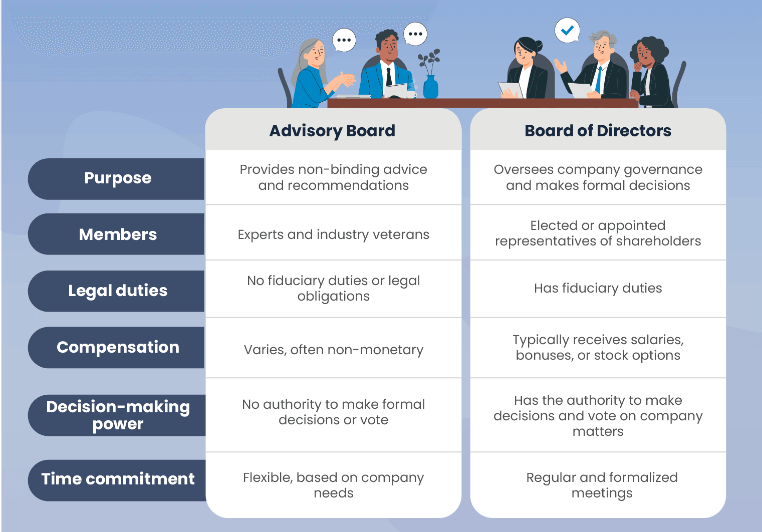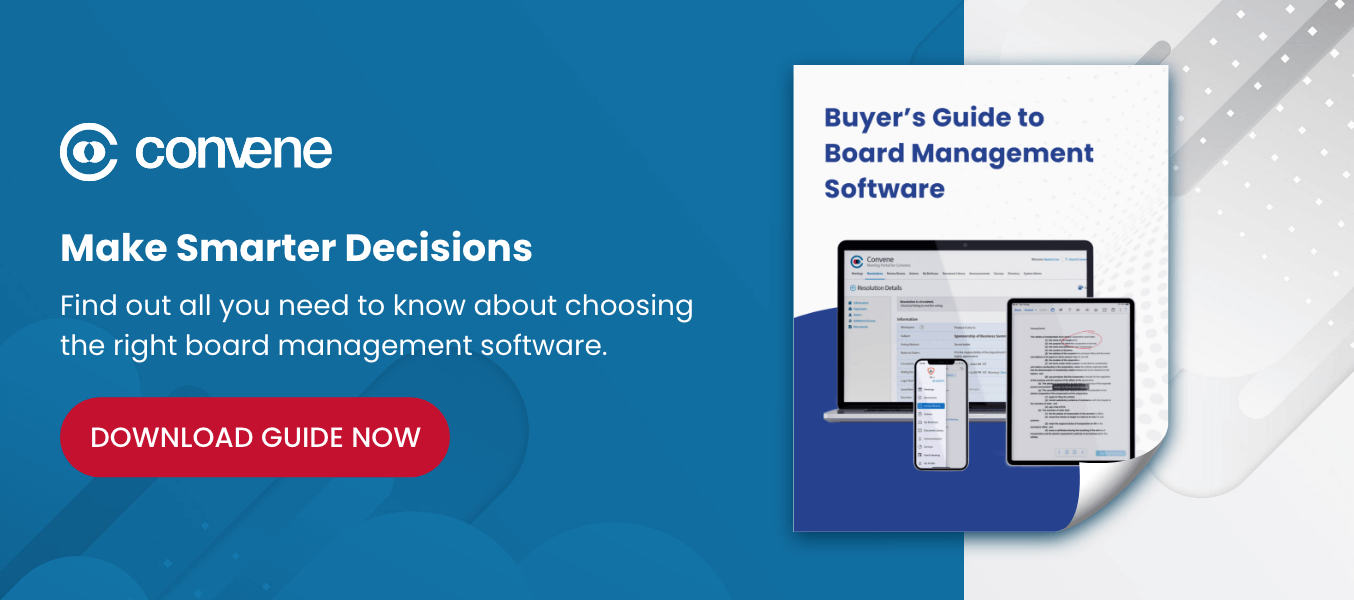Every board has its function in an organization. Most organizations have a board of trustees, which heavily focuses on safeguarding the organization’s mission, assets, and well-being, while others may have a board of directors that oversees the company’s operations and performance.
Advisory boards, in particular, play a crucial role by providing expert advice and guidance to the company’s owners, executives, directors, or shareholders. They consist of individuals with specialized knowledge and experience in relevant fields, offering fresh perspectives on business decisions and solutions to potential challenges. Does your organization need one?
Here you will learn everything you need to know about the board of advisors, including its function, benefits, and how to become an advisory board member.
Advisory Board Definition
An advisory board is a group of individuals who advise the board of directors regarding business decisions and strategic initiatives. They are often experts in their field and well-connected to industry networks, allowing them to offer valuable insights, introduce the company to potential partners, and open doors to new opportunities. Advisory board members are usually unpaid and serve voluntarily. However, they may receive allowances and compensation for travel expenses incurred during meetings.
What is the purpose of the board of advisors?
A report published by the Advisory Board Centre shows a 20 percent increase in the number of advisory boards globally between 2021 and 2023. This shows an increasing trend in recognition of the value that advisory boards bring to the table.
The board of advisors is the company’s sounding board. Unlike the board of directors, advisory board members do not make decisions for the organization and have no fiduciary duties or legal responsibility for it. Rather, they offer guidance in handling its legal and financial obligations, recommend strategies to improve day-to-day operations, and provide feedback based on their expertise and experience.
In a nonprofit setup, the advisory board’s responsibilities are purely as a support position to the board of directors, that helps shape and refine the decision-making process. Although they are not part of the management team, their insights and recommendations can significantly influence the corporation or a nonprofit organization’s direction.
Advisory Board vs. Board of Directors
Advisory boards and the board of directors both play crucial roles in guiding the organization. However, they have different functions and responsibilities. As previously explained, the advisory board acts as the consultative body that offers expert advice without formal decision-making power or legal obligations. In contrast, the board of directors holds significant authority and legal responsibility over corporate matters. It’s their call to make major business decisions that involve executive appointments, mergers, or anything else that keeps the company running smoothly and profitably.
Here is a quick advisory board vs. board of directors comparison table to highlight their key differences:

Advisory Board Roles and Responsibilities
As the advisory panel, the board must be able to provide the following:
- Strategic Guidance: One of the reasons why they are needed in the company, an advisory board member must provide high-level advice on the company’s strategy and help refine business plans and goals based on industry expertise and experience.
- Expert Insights and Problem-Solving: They are expected to offer specialized knowledge on market trends, industry developments, and emerging opportunities while assisting in identifying and addressing challenges with innovative solutions.
- Networking and Connections: As industry veterans, the board of advisors brings a web of connections from all over the world. They need to leverage these networks to introduce the company to potential partners, investors, clients, and other valuable contacts that can support business growth.
- Mentoring and Facilitation: The advisory board also needs to mentor the company’s executives or management team and facilitate discussions and brainstorming sessions to generate new ideas and perspectives.
It is important to note that the advisory board’s role ends where the board of directors’ starts. For instance, with a proposed merger or acquisition, the advisory board might provide valuable insights into market conditions, potential synergies, and strategic fit. They could also advise on valuation and due diligence processes. However, the final decision on whether to proceed with the merger, how to structure the deal, and the agreement terms rests with the board of directors and the company’s management team.
All these specificities, including the structure and procedures, must be established in their Charter to ensure that the board of advisors does its functions effectively.
What are the benefits of having an advisory board?
Having an advisory board brings many benefits to a company, ultimately enhancing its strategic direction and overall effectiveness. For example, a community advisory board gathers diverse members of the community to create initiatives that are better aligned with the interests and values of local stakeholders. Other key advantages involve:
Offering Fresh Perspectives
External advisors provide new viewpoints and innovative ideas that internal teams might overlook. Advisors often come from varied industries and backgrounds, offering insights that may not be present within the organization. This diversity can lead to novel approaches and solutions to existing challenges. Moreover, since advisory board members are not involved in the day-to-day operations, they can provide an unbiased view of the company’s strategies and practices, which helps identify areas for improvement that internal teams might miss.
Extending Your Network
Through their networks, the board of advisors can facilitate partnerships with other organizations, leading to collaborations that can enhance the company’s product offerings or market access. Nonprofit organizations can benefit from them by having them introduced to potential sponsors and partners that can forward their advocacies. At the same time, advisory boards can help the company connect with valuable resources and key talents to support continued growth and development.
Enhancing Credibility
A well-respected advisory board can reassure investors of the company’s leadership and strategic direction, increasing their confidence and willingness to invest. Similarly, it attracts more partners, donors, and volunteers for a nonprofit organization. For customers, especially in B2B sectors, a strong advisory board can be a sign of a reliable and forward-thinking company. This assurance enhances the company’s reputation and customer loyalty.
How to Create Your Advisory Board

Creating an advisory board is a tall order and as your company grows, your board might need to change along with it. But how you structure it initially defines its effectiveness and impact. Here’s how to do it:
- First, you need to identify what you need. Determine the specific areas where you need guidance, such as finance, marketing, technology, or industry-specific knowledge.
- Once done, look for individuals with a proven track record in the areas you identified. Consider their experience, skills, and network. While you can use industry-specific job boards to search for candidates, it’s better to attend conferences, webinars, and networking events to meet potential candidates in person.
- Ensure that potential members share your organization’s vision and values. They should be passionate about your business and willing to commit time and effort. Pay close attention to their longevity in previous relevant roles and their career progression.
- Keep the board small. You will need at least five members to streamline the advisory process.
- Once you’ve selected the members of the advisory board, formalize the relationship with a clear agreement outlining their responsibilities, time commitment, and any gratuity.
Remember, as much as you are choosing them, they must have enough motivation to choose your organization. Since they serve voluntarily to help your organization, you need a clear objective and a strong value proposition to attract and keep them.
Frequently Asked Questions About Advisory Boards
Are advisory board members paid?
Every company and situation is unique. A nonprofit advisory board member usually serves without direct compensation, while startup advisors are compensated with equity or stock options for their services. Corporate advisory board members may get paid half of what regular board members get paid. It all depends on the type of organization and the specific needs and expectations of the board members.
How to become an advisory board member?
There is no one set path to take to be a part of the board of advisors. Typically, it would take 7-10 years to prepare with the first years spent obtaining a Master’s degree and the rest by accumulating the necessary work experience and expanding network. A suitable advisory board member candidate must be independent-thinking, culturally fit, and have skills in project management, technical proficiency, leadership, and problem-solving.
Champion Advisory Board Management with Convene

A functioning advisory board demands a lot of documentation and meetings to ensure effective communication and decision-making. Most of the time, it could get overwhelming to keep track of things that need to be done. Fortunately, there is a way to simplify board management by using board portal software for nonprofits.
Convene, the leading nonprofit board management software, offers several features that can streamline your meeting processes, including:
- Secure Document Repository: Convene’s Document Library ensures that all important documents are stored in a centralized location. Members can easily access, share, and collaborate on documents without worrying about data breaches or loss of information. This promotes seamless communication and keeps everyone on the same page.
- Audit Trail: This feature keeps a detailed record of all actions taken within the system. This helps maintain transparency and accountability, as advisory board members can track changes, view who accessed or modified documents, and review the history of decisions and discussions.
- Live Video Conferencing and Annotation Tools: Live video conferencing allows for face-to-face interactions, even when members are geographically dispersed. Annotation tools let participants mark up documents in real-time, facilitating more dynamic discussions and immediate feedback during meetings.
Learn more about Convene’s important features here, or schedule a detailed walkthrough of one of the best board portal software in the market today!
Jess is a Content Marketing Writer at Convene who commits herself to creating relevant, easy-to-digest, and SEO-friendly content. Before writing articles on governance and board management, she worked as a creative copywriter for a paint company, where she developed a keen eye for detail and a passion for making complex information accessible and enjoyable for readers. In her free time, she’s absorbed in the most random things. Her recent obsession is watching gardening videos for hours and dreaming of someday having her own kitchen garden.











